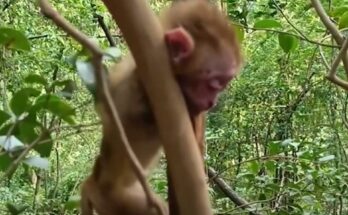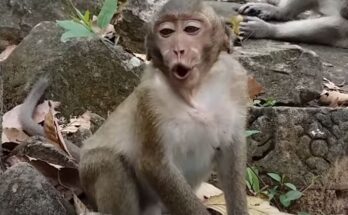A baby orangutan sits quietly, his wide, innocent eyes scanning the lush jungle around him. Perched on a low-hanging branch, he clings tightly to the bark with his tiny, dexterous fingers, his fluffy orange fur glowing softly in the dappled sunlight. He looks lost in thought, his small body swaying gently with the movement of the trees. His world is a delicate balance of curiosity and vulnerability as he waits for the most important presence in his life to return—his mother.
In the wild, the bond between a mother orangutan and her baby is one of the closest in the animal kingdom. For the first six to seven years of their lives, young orangutans are entirely dependent on their mothers. They learn everything from her: how to climb, forage, build nests, and navigate the dense forest that will one day become their home. The mother’s absence, even if temporary, leaves the baby with an overwhelming sense of vulnerability, though nature equips him with resilience.
As the baby orangutan waits, the jungle hums with life. The air is thick with the buzz of insects and the occasional squawk of a bird cutting through the symphony of rustling leaves. The baby, still too young to venture far on his own, clings to the tree, watching intently for any sign of his mother. He sniffs the air, hoping to catch her familiar scent, and occasionally lets out soft whimpers, a call that echoes faintly through the trees.
For his mother, this brief separation is a necessary part of survival. Orangutan mothers often leave their young for short periods to search for food or assess potential dangers in the vicinity. Her absence is always calculated; she never strays too far. Somewhere in the dense foliage, she is likely scaling a fruiting tree or stripping bark to find insects, all while remaining attuned to the sounds her baby might make.
The baby orangutan shifts nervously, his instincts urging him to stay put. His world is both small and expansive—a single tree and its surrounding canopy form his current universe. Despite his inexperience, he has already learned some vital lessons: how to grip tightly with his hands and feet, how to balance on branches, and how to use his voice to communicate. Yet, without his mother, the jungle feels immense and intimidating.
Suddenly, a faint rustling breaks the monotony of the forest sounds. The baby’s head snaps in the direction of the noise. His small heart beats faster as he clings tightly to his perch, his wide eyes scanning the greenery. From the shadows, a familiar figure emerges—his mother. Her strong, graceful movements exude confidence as she swings from branch to branch, her long arms and legs perfectly adapted for life in the trees. She carries a small bundle of leaves, evidence of her foraging success.
The reunion is tender and reassuring. The baby squeals with delight, reaching out to her. She pulls him close, cradling him against her chest. In that moment, the forest feels safe again. Wrapped in her protective embrace, the baby relaxes, his small world complete once more. The jungle hums on, indifferent to their reunion, but for the baby orangutan, it is everything.
4o


